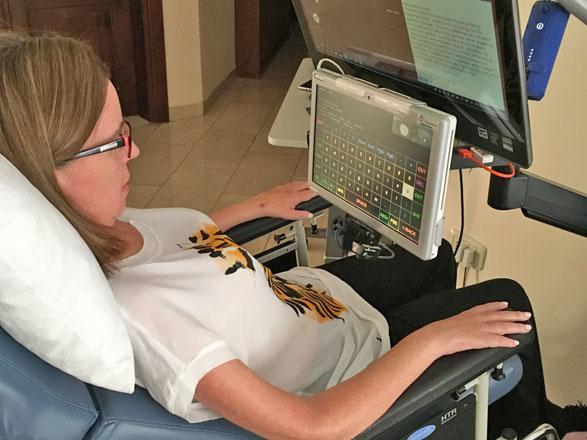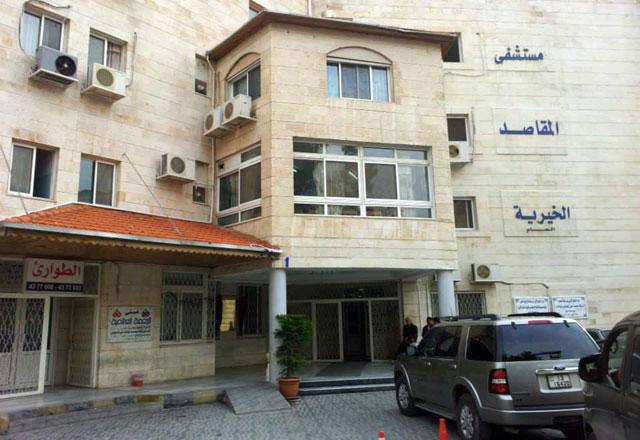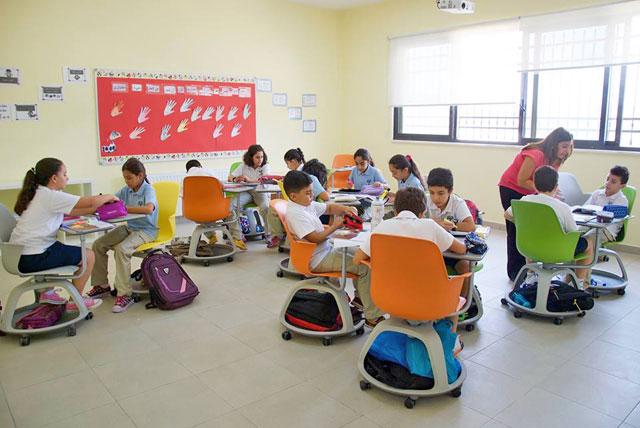You are here
Paralysed Jordanian beats the odds to bring hope to peers
By Camille Dupire - Feb 10,2018 - Last updated at Feb 11,2018

Lana Bataineh uses the computer programme Eye-Gaze to communicate with others through an eye tracking technology (Photo courtesy of Loofyonline)
AMMAN — Conducting an interview with someone suffering from Amyotrophic Lateral Sclerosis (ALS) would sound impossible for anyone aware of the physical impact of this rare neurological disease.
ALS, most commonly known as Lou Gehrig’s disease, provokes the gradual destruction of nerve cells responsible for voluntary muscle movement, leading to the impossibility to speak, swallow and eventually breathe.
Beating all odds, Jordanian Lana Bataineh said she “started living even more fully” after her diagnosis 12 years ago.
“My ALS was a blessing in disguise,” she said, noting “ALS has taken away much of my physical movement, but not my spirit or mind.”
“I am not much of a talker these days, but believe me, I have lots of interesting thoughts circulating in my head all day,” she told The Jordan Times with humour.
On Loofyonline, a blog she started with the help of her youngest son Karim in 2016, Bataineh began sharing with the world her thoughts and feelings about her daily life and the difficulties of living with the debilitating disease.
“She treated it as a private diary at first and she did not show the posts to anyone but me,” Karim recalled, adding that “when I saw the potential her words could have in impacting the people around her, I kept asking her to publicise it”.
After a month, Bataineh posted her first articles, titled “My First Blog Post — Hello” and “Happiest Day of My Life”, where she stated: “With every physical muscle atrophying, my spirit has grown in strength. I hope through reading my blog you will get to see what has nourished me with life and strength to survive this so-called ‘illness’.”
A personal insight into the life of people living with ALS, Loofyonline quickly burst with public attention, attracting tonnes of comments, shares and personal messages.
On the first day of publication, Bataineh’s first post gathered over 5,000 views, Karim remembered.
Ala Nuseibeh, who also lives with ALS, commented on Bataineh’s post on positivity, saying “You are amazing. Your guidance is so important to me. I am going through the phase of bitterness but reading your blog, I can now leave this bitterness behind and concentrate on positivity.”
“I thought I would reach perhaps a handful of people. Never in my wildest dreams did I think that my blog would reach so many people from all over the world,” Bataineh recalled, adding “from the very first post, the response was overwhelming. With each post, my readers and followers grew and grew into tens of thousands”.
Only able to use her eyesight to communicate with others, Bataineh employs the computer programme Eye-Gaze, which helps her “speak” with others through an eye-tracking technology that uses a camera following the pattern of her eyes on the screen’s keyboard.
“My computer has become my voice. It has also helped me communicate with the world by enabling me to log on to the Internet and access a variety of social media, e-mails and more,” Bataineh, a mother of three, explained.
Taking everything with humour and wittiness, Bataineh said: “From the day I got this programme nine years ago, nobody has been able to silence me!”
However, she has come a long way to acquire this positivity. She remembered how devastated she was when specialists told her to “get her things in order” over a decade ago. “As a mother, I could not find the strength to accept that I would not give advice, share a joke, discuss life, or simply say ‘I LOVE YOU’ to my children and husband,” she told The Jordan Times through messages sent using Eye-Gaze.
In spite of her positive attitude, Bataineh is very aware of the limitations she is facing, especially in an environment like Jordan, which lacks many of the capacities needed for people with disabilities.
“Being confined to a wheelchair is hard, but being confined to a wheelchair with nowhere to go is worse. I live in Amman, which is known for its beautiful weather, but most of the activities I used to love are now out of reach for me,” she explained, noting that “it gives me no joy to point out the mishaps in my country as I have tremendous love and appreciation for my community”.
She pointed out how “disappointed” she is at the lack of consideration to the wheelchair community at multiple levels including urban planning, zone ordinances and building code regulation.
“These difficulties are just a fraction of what we have to endure in order to leave our house,” Lana explained, urging for Amman to be “more like places such as Dubai, which are more accommodating and accessible to the wheelchair community”.
Related Articles
AMMAN — A video recently released by the Higher Council for the Rights of Persons with Disabilities (HCD) highlighted the difficulty faced b
AMMAN — Despite an increasing number of initiatives implemented to raise awareness on accessibility for people with disabilities in Jordan,
AMMAN – A photo of sanitation workers transported in the back of a truck sparked anger and criticism on social media outlets on Thursday.In


















